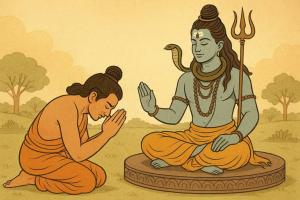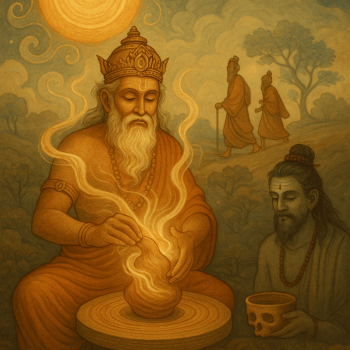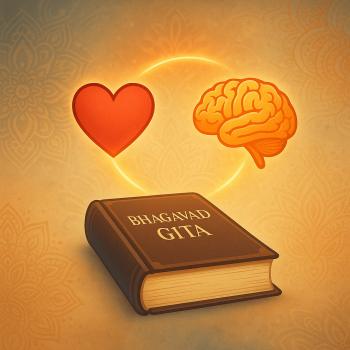
Guru Purnima is a sacred day dedicated to honouring the Guru, the one who dispels darkness and guides the seeker toward truth, light, and self-realization. In Hinduism, Buddhism, and Jainism, this day holds immense significance. It is not only a day of offering gratitude but also a day of deep inner reflection, letting go, and forgiveness—qualities that are essential for spiritual growth.
At its core, Guru Purnima is not about worshipping a person—it is about awakening the Guru within, by cultivating humility, learning from our mistakes, and releasing the burdens of resentment, guilt, and ego. One of the greatest paths toward this awakening is through forgiveness.
The Guru Forgives: The Story of Upamanyu and Lord Shiva
Let us begin with a lesser-known yet profound story from the Puranas that connects both Guru Purnima and forgiveness.
A young boy named Upamanyu, the son of Sage Vishwanar, longed for spiritual awakening. He was advised to worship Lord Shiva, the Adi Guru (the first Guru). With a heart full of faith, he went into the forest and began intense austerity. Over time, he stopped eating, stopped sleeping, and stood still in meditation, his body growing frail but his soul becoming sharp with concentration.
Pleased by his unwavering devotion, Shiva decided to test him—as all great teachers do. Disguising himself as Indra, the king of the gods, Shiva approached the boy and said,
“Why do you waste your time on a deity like Shiva? He is ash-smeared, lives in cremation grounds, and keeps company with ghosts. Worship me instead—I am the lord of heaven!”
These words struck Upamanyu like fire. His eyes burned with anger. He stood up and said,
“You dare insult my Guru! Shiva is not just a deity—he is my very breath, my path, and my destination. I would rather give up my life than abandon him!”
In that moment, out of sheer loyalty and hurt, Upamanyu invoked a deadly weapon to attack “Indra.” Before it could harm him, Lord Shiva revealed his true form.
Upamanyu fell at his feet, shaken and ashamed.
“Lord! I failed to recognize you and in my anger, I committed a grave mistake. Please forgive me.”
Shiva smiled, lifted him up with compassion, and said,
“You did not fail—you passed. Your unwavering faith and willingness to defend your Guru showed your readiness for true knowledge. I forgive you, and I bless you.”
He then initiated Upamanyu into the sacred truths of the universe, transforming him into a great sage.
What This Story Teaches
This story is not merely mythological—it is psychological and spiritual. It reveals that:
-
The Guru tests, not to punish, but to purify.
-
The disciple falters, not because of weakness, but because he is still learning.
-
Forgiveness, given and received, is the bridge between human imperfection and divine wisdom.
On Guru Purnima, we are called to bow—not just to the teacher outside, but to the inner guide. But how can we access this inner light if our minds are clouded with guilt, resentment, anger, or regret?
That is where forgiveness enters as a sacred practice.
Forgiveness as a Guru
Just as a Guru shows us our weaknesses so we can overcome them, forgiveness reveals to us where we are still holding on to pain. Forgiving others is difficult. But even harder is forgiving ourselves—for the harsh words we said, for the things we failed to do, for the opportunities we let slip away.
Yet the Guru does not look for perfection. The Guru looks for sincerity.
On this Guru Purnima, ask yourself:
-
Can I forgive someone who hurt me long ago, and in doing so, free myself?
-
Can I forgive myself for the ignorance of my past?
-
Can I allow my mistakes to become lessons rather than prisons?
Symbolically Offering Forgiveness to the Guru
In ancient traditions, Guru Dakshina (an offering to the teacher) was given not just in the form of wealth or service, but sometimes in the form of transformation.
What if this Guru Purnima, we offer our teacher:
-
A heart free from bitterness.
-
A mind ready to learn, without ego.
-
A soul softened by forgiveness.
Whether your Guru is a living person, a divine form, or sacred scripture like the Bhagavad Gita, remember: the greatest tribute to a teacher is not just praise—it is change.
A Modern Reflection
We live in a world full of distractions, divisions, and emotional pain. Often, we carry old grudges and unresolved grief like heavy backpacks. Guru Purnima offers a pause. It invites us to sit still and reflect:
“What can I release today to move forward lighter?”
Forgiveness is not a favour to others—it is freedom for ourselves. The Guru shows us the way, but it is we who must walk the path. And every step becomes easier when the burden of unforgiveness is lifted.
On this sacred day of Guru Purnima, let us honour our Gurus not only with flowers, incense, or words, but with a conscious decision to forgive—to forgive those who hurt us, to seek forgiveness where we have erred, and to begin anew with grace.
In the light of the full moon, may your heart also become full—with clarity, compassion, and courage.












